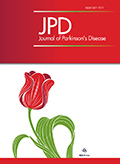Authors: Kader, Manzur | Ullén, Susann | Iwarsson, Susanne | Odin, Per | Nilsson, Maria H.
Article Type:
Research Article
Abstract:
Background: While walking difficulties are common in people with Parkinson’s disease (PD), little is known about factors that independently contribute to their perceived walking difficulties. Objective: To identify factors that independently contribute to perceived walking difficulties in people with PD. Methods: This study involved 243 (62% men) participants; their mean (min-max) age and PD duration were 70 (45–93) and 8 (1–43) years, respectively. A postal survey preceded a home visit that included observations, clinical tests, questions and questionnaires that were administered as a structured interview. Perceived walking difficulties (dependent variable) were assessed with the self-administered
…generic Walk-12 (Walk-12G, scored 0–42, higher = worse). Independent variables included personal (e.g., age and general self-efficacy) and social environmental factors (e.g., social support and living situation) as well as disease-related factors including motor (e.g., freezing of gait (FOG) and postural instability) and non-motor symptoms (e.g., fatigue and orthostatic hypotension). Linear multiple regression analysis was used to identify factors that independently contributed to perceived walking difficulties. Results: Eight significant independent variables explained 56.3% of the variance in perceived walking difficulties. FOG was the strongest significant contributing factor to perceived walking difficulties, followed by general self-efficacy, fatigue, PD duration, lower extremity function, orthostatic hypotension, bradykinesia and postural instability. Conclusion : Motor and non-motor symptoms as well as personal factors (i.e., general self-efficacy) seem to be of importance for perceived walking difficulties in PD. These findings might nurture future interventions that address modifiable factors in order to enhance walking ability in people with PD.
Show more
Keywords: Difficulty walking, fatigue, Parkinson Disease, patient outcome assessment, regression analysis, self-efficacy
DOI: 10.3233/JPD-161034
Citation: Journal of Parkinson's Disease,
vol. 7, no. 2, pp. 397-407, 2017
Price: EUR 27.50






